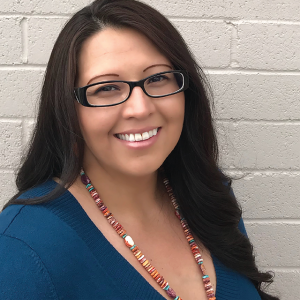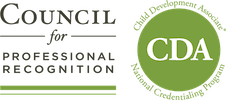 “There’s an old coming-of-age ceremony that some Native American tribes still perform,” Hunter says. “It’s an occasion to honor a young boy or girl as they enter a new stage in their lives. It’s also about helping these young adults understand their role in the community where they live. The rituals that take place involve the young person running or dancing to show their physical prowess. They might also cook a meal for family members and mentors who’ve guided them in life. And the point is to help the young person realize they have a duty to help form the next generation.” And Candida does this as senior director of tribal affairs for First Things First, an Arizona government agency that supports programs statewide through grants to community groups that serve children from birth to age 5 and their family members.
“There’s an old coming-of-age ceremony that some Native American tribes still perform,” Hunter says. “It’s an occasion to honor a young boy or girl as they enter a new stage in their lives. It’s also about helping these young adults understand their role in the community where they live. The rituals that take place involve the young person running or dancing to show their physical prowess. They might also cook a meal for family members and mentors who’ve guided them in life. And the point is to help the young person realize they have a duty to help form the next generation.” And Candida does this as senior director of tribal affairs for First Things First, an Arizona government agency that supports programs statewide through grants to community groups that serve children from birth to age 5 and their family members.
Hunter wasn’t much older than some of the children who First Things First assists when she learned the value of service. “I grew up on the Hualapai Reservation in northwestern Arizona across the street from Head Start,” Hunter recalls. “My mom worked at Head Start, first as a teacher before becoming health coordinator, then education coordinator. And she’s been my major source of inspiration. For as long as I can remember, I was always at Head Start. I would go over there and help clean up or chat with the cook while she was getting meals ready for the next day. Then when I was older, I would help the teachers prepare their materials for class or work on fundraisers with parents. And I especially loved being there at Christmas time because I got to dress up as an elf to help Santa Claus and Mrs. Claus deliver gifts to the kids.”
And these fond memories of Head Start stayed with Hunter after she turned 16. At that time, she stopped volunteering at Head Start since her family moved off the reservation. “But now I’ve come full circle as I work on policies and systems that impact children and families,” Hunter says. The route back to her roots took her to Kingman High School near Peach Springs, AZ, then to Chapman College in California, where she earned her bachelor’s degree in psychology before returning to work in the community from which she came.
Over the course of six years, she served as Hualapai education coordinator, as well as a member of the Hualapai Higher Education Committee. She spent a two-year stint on the Grand Canyon Resort Corp. board of directors—an economic development arm of the Hualapai government that works to bring the area more jobs. She was also elected to the Hualapai Tribal Council, where she served for five years and began to expand her network statewide.
Now Hunter uses the knowledge she gained in this role to build bridges between First Things First and Arizona tribes. As senior director of tribal affairs, she helps ensure effective government-to-government relations between her agency and the state’s tribes, builds and strengthens bonds with tribal partners, fosters tribal relations though collaborative partnerships, and fosters the provision of early childhood services in culturally responsive ways.
“One of the things the tribes have described as a priority is to train teachers who look like the children they serve and relate to their tribal culture,” Hunter explains. “Many of the tribes are rural, and the people who are working in these programs sometimes come from outside the community. So, we provide funding to hire people from within the community who can assess what’s happening in the classroom, serve as interpreters and coach the teachers. The tribes also do a good job of sharing what their community is like and providing guidance on the best ways to work with its families and children.”
The tribes’ priorities also get official recognition because First Things First holds tribal consultations to inform its practices and policies. This is an effort Hunter is especially proud of since she was the one behind it. And the tribes like it, too, because it allows them to partner with First Things First and have a say in the investments made in their communities.
“One of the things that the tribes have identified as important is to train their own people to teach the young children,” Hunter explains. “So, we fund programs that provide scholarships for early childhood teachers and bring folks together in a cohort when they’re trying to earn their Child Development Associate® (CDA) Credential™. Some of our regional councils are also supporting CDA® training in local high schools, programs I like to call incubator classrooms since you have students taking classes at a high school and working at a center as part of getting their credential. Then they go on to get their BA and often return to teach in their tribal communities.”
Supporting these high schoolers on their career path is part of what Hunter calls her “grow your own model”—another priority for the communities she serves. “The tribes are working to make sure they have their own people in leadership positions,” she says. “And that starts early on by giving young children a solid foundation and supporting the ECE professionals who prepare them for the future.”
While Hunter doesn’t work directly with children or teachers, she does get a chance to see what’s going on in classrooms as part of her community engagement work. “I make site visits if we’re taking a tribal leader or state lawmaker to see the results of our funding and grants,” she says. “I also work a lot with our regional directors from First Things First. They’re the ones who really partner directly with our tribal programs and early childhood centers,” she explains, “and it’s been gratifying for me to see them grow in their role as community leaders.”
During these visits to child care centers, she has also found it “moving” to see teachers and children conversing in native languages in the classroom—a practice to which First Things First has given its support. “Our regional councils have funded efforts like developing books written in both English and in some of the native languages,” she says “They’ve also produced audio books for young parents who don’t speak the traditional language of their tribe. So, the parent is learning with the child. And the regions wanted to focus on this because they recognized that many of the tribes’ traditions and stories aren’t written down, but simply passed down by word of mouth. And one of the ways the regions are preserving the past is by developing a parenting curriculum that incorporates traditional teachings.”
This approach guides culturally responsive programs to promote physical activity and good nutrition, Hunter explains. “It helps parents advance their children’s healthy development through traditional games and foods. The tribes think this is important to building a foundation for young children, so we also help fund and support it.”
Hunter is passionately committed to efforts like this because she believes “you should be the change you want to see in the world,” as Gandhi said. And she acts on this in both her professional and personal life. “Our agency is focused on continuous quality improvement, so I’m always thinking about how I can do more to serve the tribes,” she says. “In the meantime, I do the best I can until I can do better. So, I always want to continue to grow because it’s by learning and challenging yourself that you do better,” Hunter explains.
“As a leader, you play a two-way role within both your family and your community,” she says. “You’re always learning from somebody, and somebody is always learning from you. We have to pass on the lessons we’ve learned to others to keep promoting change. I realize the systems I’ve been building for years might not come to fruition until after I’m gone,” Hunter says. So, she’s planting seeds in the next generation that will inspire its members to continue her work.
“My life is about service to others,” she says, “and that relates to my going away to school and coming back to assist my people. But now my mission has expanded beyond simply serving my people to serving all people. What made me change was having a daughter and becoming an aunt to three young boys. Now I’m teaching them all the value of service. I don’t know if they’ll follow my path of moving away and then coming back to work with our tribe. But wherever they go, I want them to remember where they came from and how important it is to give back”—a meaningful message everyone can embrace. If you have a strong sense of community, like Hunter does, the whole world can be your tribe.

 “There’s an old coming-of-age ceremony that some Native American tribes still perform,” Hunter says. “It’s an occasion to honor a young boy or girl as they enter a new stage in their lives. It’s also about helping these young adults understand their role in the community where they live. The rituals that take place involve the young person running or dancing to show their physical prowess. They might also cook a meal for family members and mentors who’ve guided them in life. And the point is to help the young person realize they have a duty to help form the next generation.” And Candida does this as senior director of tribal affairs for First Things First, an Arizona government agency that supports programs statewide through grants to community groups that serve children from birth to age 5 and their family members.
“There’s an old coming-of-age ceremony that some Native American tribes still perform,” Hunter says. “It’s an occasion to honor a young boy or girl as they enter a new stage in their lives. It’s also about helping these young adults understand their role in the community where they live. The rituals that take place involve the young person running or dancing to show their physical prowess. They might also cook a meal for family members and mentors who’ve guided them in life. And the point is to help the young person realize they have a duty to help form the next generation.” And Candida does this as senior director of tribal affairs for First Things First, an Arizona government agency that supports programs statewide through grants to community groups that serve children from birth to age 5 and their family members.